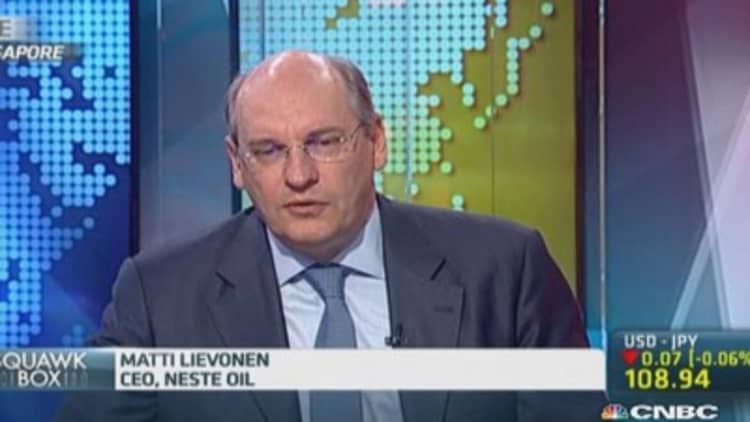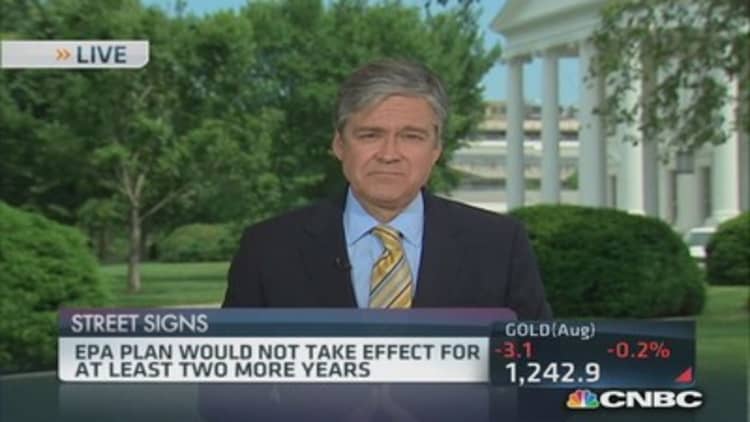John D. Rockefeller built a vast fortune on oil. Now his heirs are abandoning fossil fuels.
The family whose legendary wealth flowed from Standard Oil is planning to announce on Monday that its $860 million philanthropic organization, the Rockefeller Brothers Fund, is joining the divestment movement that began a couple years ago on college campuses.
Read More
The announcement, timed to precede Tuesday's opening of the United Nations climate change summit meeting in New York City, is part of a broader and accelerating initiative.
In recent years, 180 institutions — including philanthropies, religious organizations, pension funds and local governments — as well as hundreds of wealthy individual investors have pledged to sell assets tied to fossil fuel companies from their portfolios and to invest in cleaner alternatives. In all, the groups have pledged to divest assets worth more than $50 billion from portfolios, and the individuals more than $1 billion, according to Arabella Advisors, a firm that consults with philanthropists and investors to use their resources to achieve social goals.
More from The New York Times:
At New York March, Clarion Call for Action on Climate
Sharing Services Face Patchwork of Rules
ISISForays Send Waves of Refugees Into Turkey
The people who are selling shares of energy stocks are well aware that their actions are unlikely to have an immediate impact on the companies, given their enormous market capitalizations and cash flow.
Even so, some say they are taking action to align their assets with their environmental principles. Others want to shame companies that they believe are recklessly contributing to a warming planet. Still others say that the fight to limit climate change will lead to new regulations and disruptive new technologies that will make these companies an increasingly risky investment.
Ultimately, the activist investors say, their actions, like those of the anti-apartheid divestment fights of the 1980s, could help spur international debate, while the shift of investment funds to energy alternatives could lead to solutions to the carbon puzzle.
"This is a threshold moment," said Ellen Dorsey, executive director of the Wallace Global Fund, which has coordinated the effort to recruit foundations to the cause. "This movement has gone from a small activist band quickly into the mainstream."
Read MoreUSgas prices fall, extending summer decline
Not everyone will divest completely or right away, Ms. Dorsey noted, and some are divesting just from specific sectors of the fossil fuel industry, such as coal.

"The key thing is that they are moving along toward a common destination," she said.
Among the individual investors joining in the announcement on Monday is Mark Ruffalo, the actor. The news conference will include a videotaped message from Bishop Desmond Tutu, who said that because climate change has a disproportionate impact on the poor, it is "the human rights challenge of our time."
Just how transparent the various funds and institutions will be about the progress of their asset sales is uncertain.
At the Rockefeller Brothers Fund, there is no equivocation but there is caution, said Stephen Heintz, its president. The fund has already eliminated investments involved in coal and tar sands entirely while increasing its investment in alternate energy sources.
Unwinding other investments in a complex portfolio from the broader realm of fossil fuels will take longer. "We're moving soberly, but with real commitment," he said.
Read MoreIt can get scary being a Russian oil billionaire
Steven Rockefeller, a son of Nelson A. Rockefeller and a trustee of the fund, said that he foresees financial problems ahead for companies that have stockpiled more reserves than they can burn without contributing significantly to climate damage. "We see this as having both a moral and economic dimension," he said.
Activism to divest from fossil fuel companies began on college campuses, but the record of success there has been mixed.
The university with the biggest endowment, Harvard, has declined to divest, despite pressure from many students and outside organizations.
Drew Gilpin Faust, Harvard's president, has issued statements that she and her colleagues do not believe that divestment is "warranted or wise," and argued that the school's $32.7 billion endowment "is a resource, not an instrument to impel social or political change."

Stanford recently announced it would divest its holdings in the coal industry; Yale University's investment office asked its money managers to examine how its investments affect climate change and to look into avoiding companies that do not take sensible "steps to reduce greenhouse gas emissions." The announcement did not satisfy students pressing for divestment.
Pitzer College, however, is one of a number of schools that have promised more extensive efforts to remove fossil fuels from their endowments. Donald P. Gould, a trustee and chair of the Pitzer investment committee and president of Gould Asset Management, said that everyone involved in the decision knew that the direct and immediate effect on the companies would be minimal.
"I don't think that anyone who favors divestment is arguing that the institutions' sale of the fossil fuel company stock is going to have much impact, if any, on either the stocks or the companies themselves," he said, since the market capitalizations of the companies is immense.
Even if the movement were to depress share prices, the energy companies, which make enormous profits from their products, do not need to go to capital markets to raise money, he noted. But in the long term, he said, "divestment seeks to work indirectly on these companies by changing the conversation about the climate."
Pension funds have proved a harder sell. While Hesta Australia, a health care industry retirement fund worth $26 billion, announced last week that it would get out of coal, many others have not. PensionDanmark said in a statement that it has invested 7 percent of its $26 billion portfolio in renewable energy with plans to raise that percentage over time. "Divestment will itself not contribute to solving the challenges of global climate change, and we believe it is not a very wise way to try and solve the issue," the company said.
Torben Moger Pedersen, the fund's chief executive, added that if the returns from a traditional carbon-based power plant and a wind farm were equal, the fund would invest in the wind farm. But, he added, "We are not missionaries."
Read More
In an interview last week at the Rockefeller family's longtime New York offices at 30 Rockefeller Center, Mr. Heintz, Mr. Rockefeller and Valerie Rockefeller Wayne, the chairwoman of the fund, spoke of the family's longstanding commitment to use the fund to advance environmental issues.
The family has also engaged in shareholder activism with Exxon Mobil, the largest successor to Standard Oil. Members have met privately with the company over the years in efforts to get it to moderate its stance on issues pertaining to the environment and climate change. They acknowledged that they have not caused the company to greatly alter its course.
The Rockefellers have also tried to spur change through direct investment. In the 1980s, Mr. Rockefeller said, members of the family formed a $2 million fund to invest directly in renewable-energy alternatives. They were too early.
"The fund didn't survive, which was a lesson," he said. Nevertheless, he added, the failure of the fund was "a badge of honor."
Ms. Wayne said the family's commitment is intergenerational, and continuing. She said that her 8-year-old daughter lectures her on the destruction of orangutan habitat to create palm oil plantations.
"If I'm wearing lipstick, she won't kiss me," she said, "because there's palm oil in it."
—By John Schwartz, The New York Times

